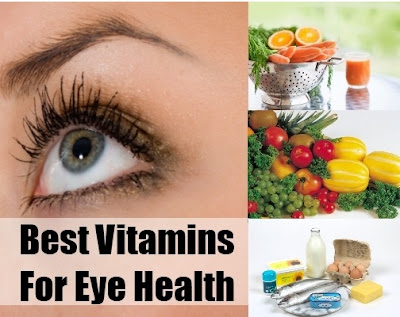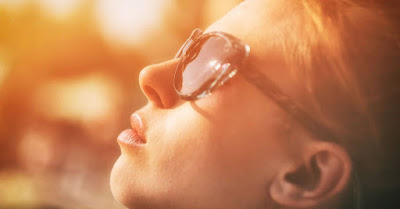How to have a good view? OR
 |
| Get better eyesight |
Although the glasses are fashionable (with his small side
intello :)) you still want to know all the tricks to preserve your sight and
keep the glasses away, well I invite you to read these few very informative
lines, which you will certainly avoid the complications that our eyes meet with
old age .... Know that we can slow down the process!
Food to protect our eyes!
 |
| Best vitamins for Eyes |
Food is at the heart of a good health in general, and it is
also valid for the sight, to keep a good sight, prefer fruits and vegetables!
Why do you tell me
Your retina likes vitamin A
Eat eggs (vitamin A is mostly present in the yolk), veal
liver, butter, meat, fish, but also carrots, tomatoes, apricots, spinach,
pumpkins, lettuce, peppers, melons ...
Beta-carotene plays an important role in vision because this
powerful antioxidant is a precursor of vitamin A. Carotenoids, including
beta-carotene, are yellow or orange pigments that give color to fruits and
vegetables. So often eat carrots, apricots, sweet potatoes, mangoes, papayas,
tomatoes, but also spinach, parsley, broccoli, etc.
The retina is made up of specific cells in the shape of
cones and rods, which transform the light into nerve impulses interpreted in
images by the brain. Cones (involved in daytime vision) and sticks (night
vision) need vitamin A to function.
Vitamin A is therefore essential for daytime and night
vision, a good adaptation of the eye to darkness, but also a good irrigation of
the eye and to prevent dry eye.
Your retina also likes omega 3
Omega 3s helps to moisturize the eye and prevent dry eyes.
They also have a recognized preventative effect on age-related macular
degeneration (AMD).
Eat fish two to three times a week while focusing on fatty
fish (salmon, herring, mackerel, sardines ...) and use vegetable oils rich in
omega-3 (rapeseed, nuts, flax). And limit oils rich in omega-6 such as
sunflower oil and red meats, deli meats, fried foods and industrial products
(pastries, donuts ...)
Your cornea and crystalline ask for vitamin C
Citrus fruits are particularly rich in vitamin C, as is
kiwifruit. But green leafy vegetables (parsley, spinach ...) and cabbages and
peppers also bring a lot of vitamin C.
Vitamin C is another antioxidant that helps fight against
free radicals, responsible for cellular aging. It protects the cornea and the
lens from oxidation and helps prevent cataracts. Note that zinc and vitamin E
are also powerful antioxidants beneficial to our visual cells.
Your macula needs Lutein and Zeaxanthin
Lutein and zeaxanthin are also antioxidants belonging to the
carotenoid family. They are therefore naturally found in fruits and vegetables
of yellow and orange color (carrots, pumpkins, corn, peppers, citrus ...) and
green (spinach, cabbage ...).
The macula, the central part of the retina, plays an
important role in the vision of details, indispensable for reading, writing,
driving, recognizing faces, etc. This area is rich in lutein and zeaxanthin
pigments that protect the macula from light-ray damage and neutralize free
radicals. Both of these pigments may help prevent cataracts and age-related
macular degeneration.
Eat black berries to protect your eyesight
Black currant, blueberries, blackberries. They are rich in
anthocyanins, pigments that act as "sunscreen" for cells, protecting
them from damage caused by the absorption of blue-green and ultraviolet rays.
The tradition is that blueberries treat venous circulation
disorders and certain diseases of the eye, including diabetic retinopathy,
glaucoma and cataracts. Many doctors recommend their patients blueberry
extracts to improve their eyesight.
Where can I find blueberry extracts? In capsule essentially,
very convenient to take, a real concentrate of active ingredients.
Do not wait to start losing eyesight to worry about your
eyes. And if you see dark spots or your vision drops, react even faster.
There are two main threats to the eyes: cataracts and age-related
macular degeneration, or AMD.
You can also take a daily preventive formulation of
blueberry and blackcurrant extracts lutein and zeaxanthin, as well as other
protective antioxidants.
Good lighting for your eyes!
 |
| Good lighting for your eyes! |
When you read, your eyes must be able to see clearly what
they read, under no circumstances force. So good lighting is needed like this:
When you read a book or work closely, the light should be
strong enough to properly illuminate the entire surface to which your gaze is
directed. The light source should be located, for right-handed people, above
your left side, and vice versa for left-handed people. This avoids shading that
would obstruct your vision.
The problem of screens
The screens are widespread, and are rather harmful to our
eyes and the quality of our view. Clearly we spend too much time with frozen
eyes on the screens, and earlier, it is really a major health problem! Our eyes
are not made to stand still in front of the screens.
We submit our eyes indeed to great tensions. Thus, we tend
to fix our eyes on the screen too much, to focus too much on what interests us.
As a result, our hair will not be as regular as usual.
After a while in front of the computer, our eyes may begin
to sting, to burn, signs of a loss of hydration of the cornea of the eyes. You
may also experience heaviness of eyeballs or even headaches or eyes.
 |
| Screen Effect on Eyes |
Proposed solutions for screens:
•Take
breaks regularly
•Practice
a PALMING of at least 5 minutes, to bring you relaxation (for those who spend a
lot of time in front of the screens)
•Stop for
a moment and look away with interest, not just because it's better to do it, to
relieve the tension from close-up .
•Every 15
minutes, close very slowly the eyelids completely and then reopen them
immediately afterwards also very slowly (to do at least 10 times), to
strengthen the hydration of the cornea of your eyes.
Palming to improve his sight
Among the natural methods to have a good view simply, some
are essential, essential. The practice of palms or palming is one of them.
It is a relaxation technique advocated by Dr. William BATES
(eminent ophthalmologist, 1860-1931, discoverer of the qualities of normal
vision and treatment without sight glasses) to relieve eye strain and to rest
his eyes, to restore them radiance, vigor, well-being.
 |
| Palming to improve sight |
This is the fundamental technique to progress very quickly
in the rehabilitation of the eyes.
Who can practice palming?
•Anyone
with strabismus, cataracts, glaucoma, keratitis, etc.
•Anyone
with a common refractive problem: myopic, presbyopic, hyperopic, astigmatic,
etc.
•Anyone
experiencing eye strain, even one with excellent eyesight.
How to practice palming?
Sitting or standing: elbows released on a table with
something soft underneath (blankets, pillows ...) or on tight knees. The head
rests softly, without tension of the muscles of the neck in particular
.
In lying position: elbows resting on the chest or on
blankets, the head then resting on a pillow.
•Fix your
attention for a few seconds on an object in front of you.
•Heat the
palms of your hands first by rubbing them for a few seconds against each other.
•Place the
center of each palm of your hand over the open eyes, fingers tight, those with
the right hand slightly covering those of the left hand. Your two hands, placed
at an angle, appear to form the letter A. Thus arranged, they will avoid the
passage of light.
•After
verifying the presence of total darkness, close your eyes. Be careful not to
press the eyeballs by squeezing your palms or rubbing your eyes with your
fingers.
•Rest your
mind and your eyes by forgetting them as much as possible.
•With
slow, steady breathing, you'll relax quickly and easily.
The goal of palming is relaxation and well-being. It's about
perceiving black. Visualize the field of vision, eyes closed, telling you that
it is getting darker and darker. By practicing correctly, you will see nothing
but black.
Protect your eyes from the sun!
The sun's ultraviolet (UV) rays are essential for the
assimilation of vitamin D and are beneficial for the treatment of certain
diseases such as eczema, rickets and psoriasis.
However, it is necessary to expose oneself to it in a
moderate way because UV is likely to cause cataracts or macular degeneration.
 |
| Sun Effects on Eyes |
You must protect your eyes when you are outside by avoiding
looking towards the sun and wearing sunglasses. These, according to the use
that one wishes to make, present a UV protection index on a scale of 0 to 4.
Health Canada classifies this type of glasses in three categories: aesthetics,
all use and special use. The protection rate of sunglasses ranges from 60 to
98.5% against UVA and from 87.5 to 99% against UVB.
You will have understood, your sight deserves that you
linger there a little, because your eyes are not only the reflection of your
soul, but also a much solicited sense which one must take care! Just change
some habits and complement each other to find, keep or have a good view,
simply.











Although diet and exercise won't cure any condition, the items we eat can create a huge difference. A healthy diet is significant for a better life, but did you recognize it also can positively impact your eyes? you'll have heard people (like your mom) say that carrots are good for your eyes.
ReplyDeleteThey are! It's due to the vitamins and carotenoids they contain. Fortunately, carrots aren't the sole thanks to getting these valuable nutrients. Infusing a diet with vitamins and minerals will provide your body with the natural building blocks it must stay healthy and help protect your vision. Vitamins A, C, and E, alongside the mineral Zinc, help prevent your eyes from developing a condition where the macula (a part of your eye that controls central vision) deteriorates. You'll find these vitamins and minerals in foods like carrots, broccoli, spinach, strawberries, sweet potato, foods rich in omega-3 fatty acids, citrus fruits, and more.
These vitamins and minerals, alongside a healthy consumption of antioxidants, will also help guard your retinas. If you require professional support, contact Dr. Monica Jain.
Learn More- Eye Care: Tips for good eye health